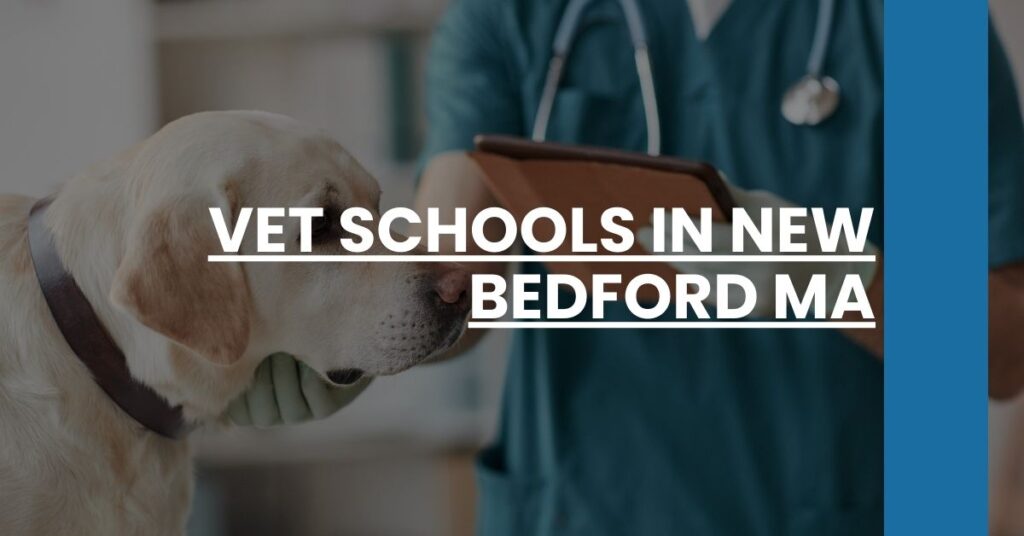Not in New Bedford? Check out our lists of Vet Schools in Boston, Brockton, Cambridge, Lowell, Lynn, Quincy, Springfield, Worcester, and across Massachusetts.
Top Vet Schools in New Bedford MA
Looking for the best vet schools in New Bedford MA? Whether you’re an aspiring veterinary professional or seeking specialized training, this guide will help you find top programs suited to your needs.
Greater New Bedford Voc-Tech – Veterinary Program
Greater New Bedford Voc-Tech is a vocational-technical high school in New Bedford, MA, renowned for its blend of academic education and practical skills training. Their Veterinary Program prepares students for immediate career entry upon graduation.
- Holistic Training: The Veterinary Program is part of a broader curriculum that includes general education and other vocational programs such as culinary arts, dental assisting, and information technology.
- Inclusive Environment: The school welcomes diversity, supporting students of different backgrounds, abilities, and statuses.
- Practical Experience: Offers students numerous opportunities to explore career options through its exploratory program, backed by comprehensive career planning resources.
- Support Systems: Provides additional assistance for students facing challenging circumstances like homelessness, pregnancy, or other transitional situations.
However, it’s important to note the limited information available on costs and hours of operation. Prospective students should reach out directly to the school for these details.
Bristol Community College – Veterinary Health Care Program
Bristol Community College (BCC) offers a focused Veterinary Health Care program designed to equip students with essential skills for a career in veterinary medicine. Here’s what makes it stand out:
- Detailed Curriculum: Covers crucial areas such as animal anatomy, physiology, nursing and handling, surgical assisting, laboratory techniques, and veterinary office management.
- Hands-On Training: State-of-the-art facilities equipped with the latest technology provide invaluable practical experience.
- Expert Faculty: Courses taught by experts in veterinary medicine ensure a high-quality education.
- Certification Eligibility: Graduates can take the Veterinary Technician National Exam (VTNE), leading to certification as veterinary technicians.
While BCC’s program is affordable and offers flexible scheduling options, it’s important to remember that it is a veterinary technician program, not a veterinary school. Graduates work under licensed veterinarians and do not receive a Doctor of Veterinary Medicine (DVM) degree.
Considering these points, Bristol Community College’s Veterinary Health Care program provides an accessible path to a rewarding career as a veterinary technician.
Massasoit Community College – Veterinary Technology Program
Massasoit Community College’s Veterinary Technology Program offers a rigorous two-year associate degree in applied science, tailored for those aspiring to become veterinary technicians.
Key Highlights:
- Accreditation: Accredited by the American Veterinary Medical Association Committee on Veterinary Technician Education and Activities (AVMA CVTEA), ensuring national recognition and adherence to high standards.
- Robust Curriculum: Focused on developing both technical skills and critical thinking. Courses cover animal care, anesthesia, diagnostic imaging, and more.
- VTNE Preparation: Prepares graduates for the Veterinary Technician National Exam (VTNE), essential for certification and practice.
- Experienced Faculty: With professionals like Roda Motta and Susan Austin leading the program, students gain insights from experts in the field.
The program emphasizes practical skills, ensuring students are job-ready upon graduation. For details on hours and tuition, contacting the program’s administrative office is recommended.
Factors to Consider When Choosing a Vet School in New Bedford MA
Selecting the right vet school in New Bedford is crucial for your career path. Here are some essential factors to consider:
- Curriculum: Ensure the program covers important topics like animal anatomy, nursing, lab techniques, and surgical assistance.
- Facility Quality: State-of-the-art facilities enhance learning and provide hands-on experience.
- Faculty Experience: Learn from experienced instructors with strong backgrounds in veterinary medicine.
- Internship Opportunities: Programs with internships offer practical experience in real-world environments.
- Accreditation: Accreditation from bodies like the AVMA CVTEA guarantees quality and recognition.
- Cost and Financial Aid: Assess the total costs and financial aid options. Affordability is crucial for managing expenses.
- Success Rates: High job placement and certification exam pass rates are indicators of program effectiveness.
- Flexibility: Programs offering flexible schedules can help balance education with other commitments.
Carefully evaluating these factors ensures you select a vet school aligned with your needs and career goals.
Conclusion: Making the Right Choice for Your Veterinary Education
Choosing the right vet school is a pivotal decision in your veterinary career journey. By focusing on curriculum quality, facilities, faculty expertise, practical training opportunities, accreditation, costs, and success rates, you can make an informed choice. The right veterinary program will provide a strong foundation, preparing you for a successful career in the field of veterinary medicine.

